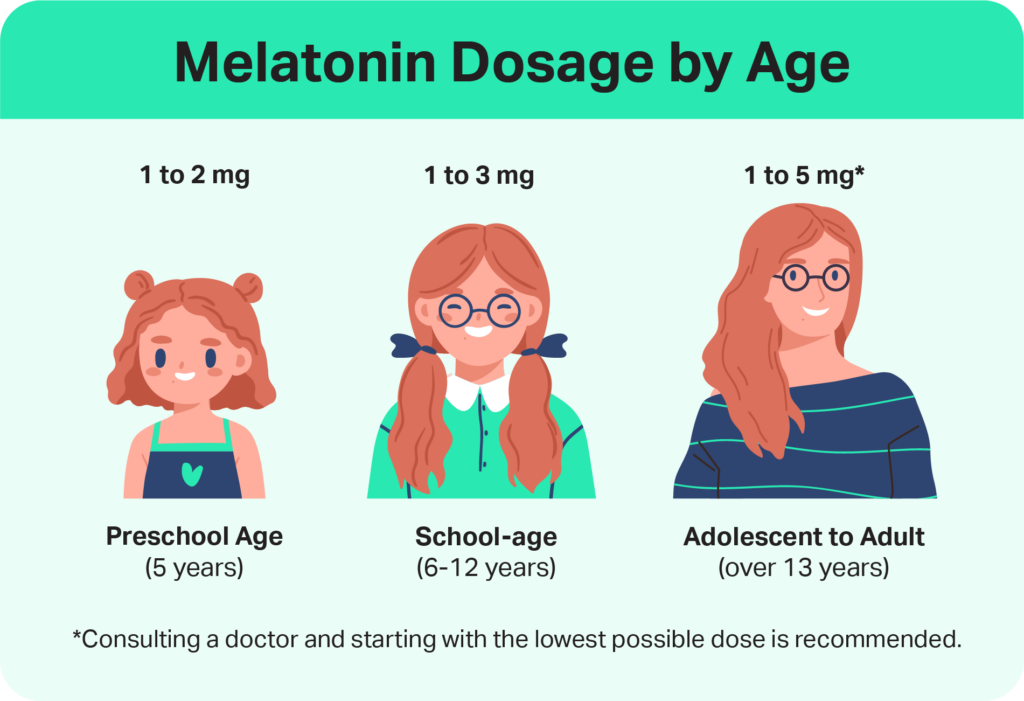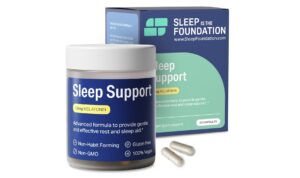Melatonin for Kids: A Guide for Parents and Caregivers
- Talk with a doctor if your child is having difficulty getting quality sleep at night before using melatonin supplements.
- The FDA has not approved melatonin for kids or adolescents for sleep disorders.
- Research indicates that melatonin may help kids prone to sleep problems, such as those with ADHD and autism.
- Melatonin is not recommended for kids younger than 5 years old.
Preliminary research suggests that melatonin supplements may aid children who are prone to sleep disorders, but this research is limited. It is important to discuss melatonin supplements with a health care professional before administering them to a child.
We take a closer look at how health care providers may recommend using melatonin, its safety and efficacy, and other considerations for parents and caregivers.
Is Melatonin Safe for Kids?
More research is needed to fully understand the safety of melatonin for children. It should be noted that the U.S. Food and Drug Administration (FDA) does not regulate melatonin and other dietary supplements like they regulate medications, and the FDA has not approved melatonin for use in children and adolescents with insomnia and other sleep disorders. However, some doctors do recommend melatonin for children sleeping poorly.
Use of melatonin in children is considered “off label” or using a drug for a purpose or group of people other than what is officially recommended. The potential risks and benefits of using melatonin should be discussed directly with your child’s pediatrician.
Melatonin for Toddlers
Melatonin is not recommended for infants or toddlers under 5 years old. Melatonin concentrations are naturally quite low in babies 3 months and younger, and their circadian systems are still developing. At this time, there are no long-term studies on melatonin use in infants.
In children 5 years and younger, sleep duration and quality can be affected by external factors such as teething, separation anxiety, or changes in routine. It may be useful for caregivers of 1- to 5-year-old children to pinpoint and treat these possible causes for sleep disruptions rather than opting for melatonin or other sedating over-the-counter medication such as allergy treatments.
“It is crucial for parents to explore behavioral modifications to resolve sleep difficulties in children in this age group.”
Dr. Nilong Vyas, Pediatrician
For children over the age of 5, a doctor may recommend lower doses of melatonin to address sleep-onset insomnia. If your infant or toddler struggles to sleep, talk to your pediatrician. They can help you identify possible causes and develop a treatment plan.

Can Melatonin Help Kids Fall Asleep?
If your infant or child is struggling to fall asleep at night or get sufficient sleep, discuss the possibility of using melatonin supplements and other strategies with your child’s health care provider. Melatonin is a possible short-term strategy for helping kids achieve quality sleep. Though research on the use of melatonin in children is limited, studies of select groups of children provide promising evidence of melatonin’s effectiveness in initiating sleep.
Melatonin and Children With ADHD
As many as 70% of children with attention-deficit/hyperactivity disorder (ADHD) experience sleep problems. They frequently experience excessive daytime sleepiness caused by initial insomnia or difficulty falling asleep at night.
Studies show that children with ADHD who take melatonin experience improved sleep. One study found a reduction in insomnia, leading to children falling asleep an average of 16 minutes earlier . However, for a child with ADHD who is on medication for their symptoms, it is important to bring the potential side effect of the inability to sleep up to their pediatrician. Ideally, adjusting the timing and dosage of ADHD medications may improve sleep latency.
Melatonin and Children With Autism Spectrum Disorders
Sleep issues affect between 40% and 86% of children with autism spectrum disorders (ASD). Studies of melatonin use in children with ASD have found improved sleep onset and sleep quantity. Some children also experienced improved daytime behavior, and there appeared to be minimal side effects.
Side Effects of Melatonin
The use of melatonin in children has not been extensively studied, and the potential risks and side effects of using it are not fully known. Children who take melatonin supplements may experience symptoms like bedwetting, drowsiness, headaches, and agitation. Parents should also be aware of the risk of accidental overdose and work closely with their child’s pediatrician on the use of melatonin.
Currently, there is little research on the long-term effects of melatonin use in children. Some experts question if melatonin, because it is a hormone, can affect other hormonal development in adolescents. Further research must be conducted to more clearly understand the long-term side effects of melatonin on children.
The safety and efficacy of supplements is not closely monitored by the U.S. Food and Drug Administration (FDA). Shoppers should take additional measures to make sure they are purchasing reputable products.
Melatonin Dosage for Kids
Parents and caregivers should consult their child’s pediatrician before giving their child melatonin in order to determine what dosage, if any, is appropriate.
The recommended appropriate dosage of melatonin for children varies among experts and depends on the age of the child and the sleep issue they are facing. Generally, dosages for children start at 1 milligram.

There are no set guidelines for what time or how frequently children should take melatonin. The dosage and timing of melatonin should be discussed with a medical professional, who can offer additional guidance for its use. It is also important to note that dosage can vary between brands and bottles of melatonin. If a parent or caregiver is dividing a single melatonin tablet or gummy to administer a smaller dose, it is difficult to keep these doses consistent each time.
Melatonin Poisoning in Children
Melatonin should be properly stored and kept out of reach of children. In recent years, there has been an increase in reports to poison control centers regarding the ingestion of melatonin in children. Melatonin can affect the cardiovascular, gastrointestinal, and central nervous systems. While further research is needed regarding melatonin poisoning in children, serious incidents have required hospitalization and treatment.
If you suspect your child has accidentally ingested melatonin, contact your local poison control center immediately for guidance.
What to Consider Before Giving Melatonin to Your Child
Prior to giving your child melatonin, you may want to consider other ways to help them get better sleep. Research shows that good sleep hygiene alone can eliminate pediatric insomnia in 50% of the instances in which melatonin is suggested for treatment.
First, talk to your child’s pediatrician about any behavioral issues and your current sleep practices. They can evaluate your child’s bedtime routine and further screen for sleep disorders and other health concerns.
“Occasionally, the time needed for a general pediatrician to devote to evaluating sleep and behavior practices properly during an office visit is unavailable, and exploring hiring a sleep specialist can prove beneficial.”
Dr. Nilong Vyas, Pediatrician
It is also important to properly assess any potential risks and benefits of giving melatonin to your child with their pediatrician. It should not be used for children who do not have sleep issues or in place of healthy sleep habits.
Helping Your Child Get Better Sleep
Proper sleep hygiene can also improve sleep quality and quantity. A bedtime routine at a consistent time each night provides comfort to help your child fall asleep. Your bedtime routine can include soothing activities such as taking a bath and reading a book or singing lullabies. If taking a bath is too stimulating for your child, consider adjusting the timing of the bath.
Experts also recommend that parents limit their children’s use of electronics in the hours before bedtime. The blue light from devices like phones, tablets, and TVs can delay the onset of natural melatonin release.
Work closely with your child’s pediatrician to address any underlying issues and help your child get better sleep. There are plenty of sleep strategies that can help parents, caregivers, and children work through bedtime worries and improve sleep hygiene.
Medical Disclaimer: The content on this page should not be taken as medical advice or used as a recommendation for any specific treatment or medication. Always consult your doctor before taking a new medication or changing your current treatment.

Still have questions? Ask our community!
Join our Sleep Care Community — a trusted hub of sleep health professionals, product specialists, and people just like you. Whether you need expert sleep advice for your insomnia or you’re searching for the perfect mattress, we’ve got you covered. Get personalized guidance from the experts who know sleep best.
References
7 Sources
-
Neubauer, D. N. (2023, January 3). Pharmacotherapy for insomnia in adults. In R. Benca & J. G. Elmore (Eds.). UpToDate., Retrieved March 6, 2023, from
https://www.uptodate.com/contents/pharmacotherapy-for-insomnia-in-children-and-adolescents-a-rational-approach -
Janjua, I., & Goldman, R. D. (2016). Sleep-related melatonin use in healthy children. Canadian Family Physician, 62(4), 315–317.
https://pubmed.ncbi.nlm.nih.gov/27076541/ -
Esposito, S., Laino, D., D’Alonzo, R., Mencarelli, A., Di Genova, L., Fattorusso, A., Argentiero, A., & Mencaroni, E. (2019). Pediatric sleep disturbances and treatment with melatonin. Journal of Translational Medicine, 17(1), 77.
https://pubmed.ncbi.nlm.nih.gov/30871585/ -
Weiss, M. D., Wasdell, M. B., Bomben, M. M., Rea, K. J., & Freeman, R. D. (2006). Sleep hygiene and melatonin treatment for children and adolescents with ADHD and initial insomnia. Journal of the American Academy of Child & Adolescent Psychiatry, 45(5), 512–519.
https://pubmed.ncbi.nlm.nih.gov/16670647/ -
Rossignal, D. A., & Frye, R. E. (2011). Melatonin in autism spectrum disorders: A systematic review and meta-analysis. Developmental Medicine & Child Neurology, 53(9), 783–792.
https://pubmed.ncbi.nlm.nih.gov/21518346/ -
Lelak, K., Vohra, V., Neuman, M. I., Toce, M. S., & Sethuraman, U. (2022). Pediatric melatonin ingestions – United States, 2012-2021. MMWR. Morbidity and Mortality Weekly Report, 71(22), 725–729.
https://pubmed.ncbi.nlm.nih.gov/35653284/ -
Berring-Uldum, A., Debes, N., Pedersen, C. R., & Holst, H. (2018). Melatonin for children with insomnia. Ugeskrift for Laeger, 180(19), V08170628.
https://pubmed.ncbi.nlm.nih.gov/29761771/

















